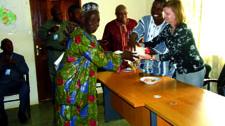In a meeting with UNMIL personnel, Landgren said the mission is coming to the end of Phase 1 of its drawdown that was approved by the Security Council. “It has been a successful first year which has happened without incident and without any significant increase in activities that could endanger peace,” she said. The UN envoy noted that the limited number and capacity of Liberia’s security personnel, and security along the border with Côte d’Ivoire, are some of the challenges that need to be addressed.
The UN Envoy said UNMIL has been supporting national reconciliation efforts as well as the decentralization process. She also stressed the importance of the Constitutional reform process with limited time for civic education and local consultations, during which the Field Offices will play a crucial supportive role.
During her courtesy call on County Superintendent Allen Gbowee, Landgren appreciated the County administration’s collaboration and cooperation with UNMIL. She informed the County leadership that during Phase 2 of the transition UNMIL will withdraw its military from Gbarpolu in about a year’s time. The UN envoy assured Gbarpolu residents that UNMIL’s transition is a very gradual and careful process being carried out in collaboration with the Government of Liberia. She highlighted decentralization and constitutional reform processes as important issues for the Counties, whose inputs and views into the processes are very crucial. The County Superintendent for requested the Constitutional review process to begin early at County level to enable the local citizenry understand the issues.
At a meeting with traditional leaders, Special Representative Landgren highlighted national reconciliation and the key role of traditional leaders in the process. She noted that this year marks the 10th anniversary of peace in Liberia, which is a very important milestone. “The UN cannot reconcile Liberians, that is a job for Liberians, to be led by Liberians,” she pointed out. She said the questions of Constitutional reform, decentralisation, and natural resource management are some of the big tasks ahead for Liberia to remain stable, secure and prosperous, and those tasks are in the hands of Liberians. “It is time to get moving with great force, great determination to conclude some of these very important initiatives that have begun,” she added. The elders on their part lamented the manner in which natural resources are being extracted from the County and benefits not realised in the life of ordinary citizens. They requested UNMIL to carefully look into the matter and recommend solution to the Government of Liberian.
During her visit, Landgren also inspected the World Food Programme (WFP) supported Purchase for Progress (P4P) rice-milling project managed by Gbarpolu women’s association. Impressed by the efforts of the women, she called for expansion and replication of such livelihood enhancement projects for women and rural dwellers in other counties.
“Ten years and counting, keep up the good work. Liberia has done an extraordinary job keeping the peace. Now as the UN starts to drawdown, it’s really time to focus on the future, and focus on all things Liberians themselves need to do,” she pointed out.
UNMIL’s Transition Gradual and Careful: Karin Landgren
- 08 May 2013
- News stories





